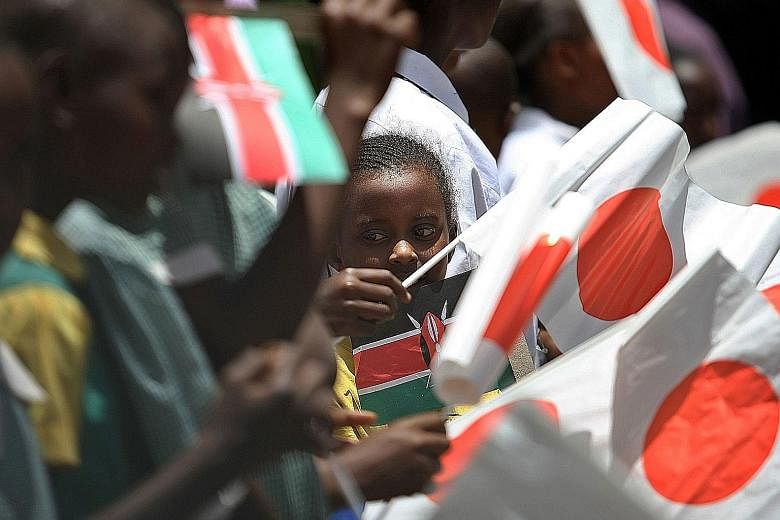The Japan-China rivalry is heating up far from their backyards, as both countries jostle for influence in Africa through billions of development dollars and summits.
Tokyo has pledged US$62 billion (S$84 billion) to Africa since 2013, a sum easily eclipsed by China's US$90 billion since 2012.
But Japanese Prime Minister Shinzo Abe seems unconcerned by that discrepancy and is stressing quality, not quantity. At the sixth Tokyo International Conference of Africa's Development (Ticad) last month in the Kenyan capital of Nairobi, he said Japanese aid will be used for "quality infrastructure" to allow "both Japan and Africa to grow together".
China has held the Forum on China-Africa Cooperation six times, including in Johannesburg last year. President Xi Jinping said then that Chinese funds will be used to develop Africa's inadequate infrastructure and train professional and skilled personnel.
Mr Abe's emphasis on quality was not lost on foreign policy observers, who note the huge economic benefits and investment opportunities in a continent that remains largely untapped.

In the 1980s and 1990s, Japan was the top donor to many countries in sub-Sahara Africa, former World Bank economist Takeshi Daimon tells The Straits Times.
But this is no longer the case.
He suggests the rise in influence of China in Africa over the decades, ironically, is partly because of rules over how Japan's aid money was used. It used to be "untied", with all projects open for global bidding.
"Lots of Chinese companies have entered Africa through Japan's overseas development assistance," says Dr Daimon, who teaches at Waseda University in Tokyo.
The policy was recently changed to be "partially tied", meaning the aid money can be tapped only by Japanese firms and companies of the recipient country.
On Chinese aid in Africa, Dr Daimon says: "It used to be small and in limited scale, and only for symbolic landmarks like soccer stadiums. Japan used to see Chinese assistance as a kind of a 'joke'.
"But it is no longer a joke. China has improved both in quality and quantity through various learning experiences - part of it through participating in Japanese projects."
Another reason is the relatively low risk appetite of Japanese firms, many of which shunned Africa because of its "high political instability and market risks".
But this is changing.
-
Multibillion-dollar rivalry
-
Japanese Prime Minister Shinzo Abe last week pledged a total of US$30 billion (S$40.7 billion) in public and private support to Africa over three years.
Some of this is expected to be used to increase the capacity of power projects, as well as to train 20,000 mathematics and science teachers and another 20,000 experts on how to handle infectious diseases.
The package comes on top of another US$32 billion that was pledged in 2013 for a five-year period- two-thirds of which has already been tapped.
Japan has invested US$47 billion in the continent since the first Tokyo International Conference of Africa's Development was held in 1993.
Meanwhile, Chinese President Xi Jinping announced US$60 billion in assistance and loans for Africa, over three years, last December. Another US$30 billion was pledged in 2012.
In terms of overall direct investment, Japan's total last year was US$1.24 billion, down from about US$1.5 billion a year earlier, said a Reuters report.
China made a single investment of US$2 billion in oil-rich Equatorial Guinea in April last year alone, the report added.
China's trade with Africa is worth US$220 billion - about 10 times that of Japan.
Walter Sim
Mr Abe, who calls Africa a "new growth centre", took more than 70 companies to Ticad to promote their businesses. Dr Yasushi Katsuma, vice-president of the Japan Society for International Development and also a teacher at Waseda University, says: "With the consequent expansion into Africa for Japanese companies, economic benefits may be expected for Japan in the long run."
Even so, the proportion of Japan's overall aid to Africa is low compared to Japan's aid to South-east Asia, says Mr Ippeita Nishida of the Tokyo Foundation think-tank.
Apart from economic benefits, Japan also sees strategic interests in helping Africa achieve political stability and maritime security, as well as in combating terrorism. Experts say that if not kept under control, these are issues that might affect the global supply chain and, in turn, the Japanese economy.
Japan's Self-Defence Forces have been deployed on an anti-piracy mission off the coast of Djibouti, while from November, military personnel will be part of United Nations peacekeeping operations in South Sudan.
Professor Heng Yee Kuang of the University of Tokyo's Graduate School of Public Policy notes parts of the aid package "involve efforts to build 'social stability' to dissuade youth from joining terror groups".
Maritime security - a flashpoint for Beijing - was mentioned in the nine-page Nairobi Declaration that covered issues such as the economy and healthcare. The document emphasises a rules-based maritime order according to international law under the UN Convention on the Law of the Sea.
A Chinese Foreign Ministry spokesman last week said Japan wanted to "impose its own will on African countries for selfish gains".
Mr Nishida thinks the reaction "seems to be a little too nervous".
"Presumably, this irritation stems from repeated criticisms of China's aid problems, like not providing employment and learning opportunities for the local workforce, and by its reduced economic influence...
"(But) China should welcome Japan's measures, as (Africa's) stable development will lower risks and also benefit their economy."

